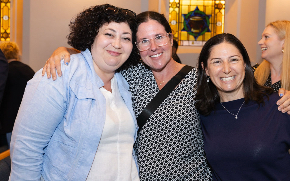New report finds online hate follows fires at Melbourne synagogues
When Melbourne’s Adass Synagogue was burned to the ground in late 2024, and the East Melbourne Synagogue’s entrance was set ablaze on 4 July 2025, you might have expected widespread public condemnation and solidarity.
Instead, a new report has revealed a torrent of online conspiracy theories, denial, and even celebration; a disturbing sign that antisemitism is being normalised in Australia.
The report, titled Responses to the Melbourne Synagogue Attacks in 2024–2025, was released on July 21 by the Online Hate Prevention Institute (OHPI). It documents more than 100 examples of harmful online content posted in response to the arson attacks. These posts reveal a coordinated pattern of disinformation and hate. Available at ohpi.org.au/synagogue-attacks, the report calls attention to the urgent need for public education and stronger institutional responses to antisemitism.

The fire-damaged doors of the East Melbourne Hebrew Congregation -Screenshot
“These responses are part of a wider problem in which antisemitism has now become normalised in Australia,” said Dr. Andre Oboler, CEO of OHPI. “By claiming the antisemitism isn’t real, and that serious and high-profile incidents are simply hoaxes… they seek to build a tolerance for antisemitism within Australian society. This creates space for the crisis to worsen.”
The report reveals that a significant number of social media posts claimed the attacks were false flags orchestrated by Jews or intelligence services to generate sympathy.
One comment stated, “Why would anyone attack a synagogue? This was obviously staged by Mossad.” Another user wrote, “As usual, the Jews set it up themselves to make themselves look like victims,” echoing rhetoric found in white supremacist forums and conspiracy circles.
Other posts went further and expressed support for the violence. One user on X (formerly Twitter) posted, “One synagogue down, many more to go,” while another commented, “A fire is too kind for what these people deserve.” Such statements not only endorse antisemitism but openly incite further violence.

Dr Andre Oboler
The report also highlights how antisemitic comments hijacked public posts condemning the attacks. For instance, under a post by a state MP denouncing the East Melbourne Synagogue fire, dozens of replies accused the Jewish community of fabricating the incident. Some quoted antisemitic conspiracy literature like The Protocols of the Elders of Zion, linking the attacks to supposed Jewish control of global events.
These incidents occurred alongside the rollout of a national Plan to Combat Antisemitism by Australia’s Special Envoy to Combat Antisemitism. That plan flagged entrenched antisemitism in sectors such as the arts, academia, and media and called for broader education and institutional accountability.
Rather than galvanise support, the release of the plan provoked a backlash. According to OHPI’s report, online responses included attacks on the Special Envoy’s legitimacy and efforts to discredit the IHRA Working Definition of Antisemitism, which underpins the plan. “Rather than acknowledging the antisemitism crisis… there have been efforts to deny there is a problem,” the report states. “Without these efforts, antisemitism would not have reached its current point of crisis.”
The report concludes with eight recommendations, including adopting a government-endorsed handbook explaining the IHRA definition within the Australian context. It also urges stronger moderation of online hate and better support for public figures targeted for standing against antisemitism.
It also calls for broader public education initiatives to raise awareness and improve recognition of antisemitism across all levels of society, including institutions such as the arts, universities, and media. The report urges social media platforms to improve content moderation practices to prevent the viral spread of antisemitic conspiracy theories and hate speech.
The OHPI’s findings underscore a chilling reality: the digital realm is not merely reflecting, but actively amplifying, a dangerous normalisation of antisemitism in Australia. As Dr. Andre Oboler explains, “Without these efforts, antisemitism would not have reached its current point of crisis.” This critical report serves as a resounding call to action, urging Australian society, governments, and social media platforms to implement comprehensive educational initiatives and robust moderation practices to decisively counter this escalating threat.








Let’s see what PM Albanese does with this additional reportage. It seemed with his initial verbal response to Jillian Segal’s report that most certainly some of her recommendations would be referred to later talking points rather than seeing action. Also the fact that he’s waiting on a report on Islamophobia to arrive on his desk before acting for the Australian Jewish communities speaks to where he places it in his mind. These latest findings should squash that. He needs to get serious, very serious indeed.